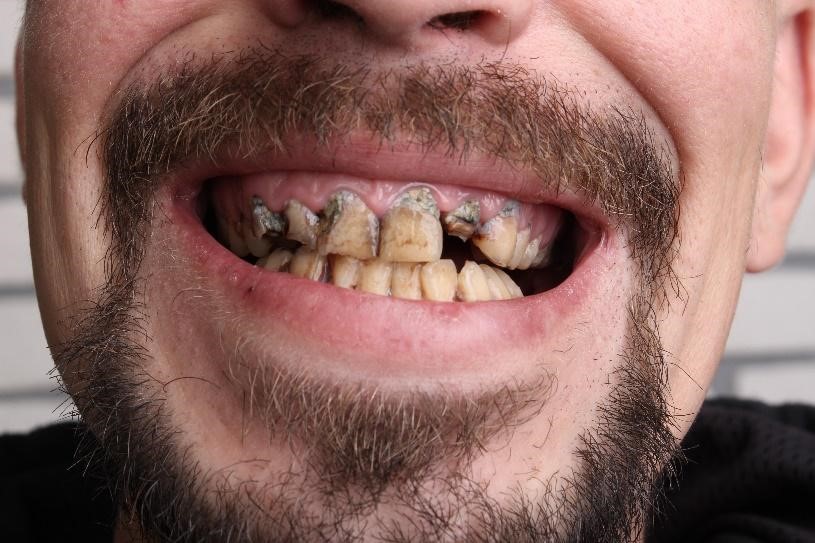Methamphetamine, also known as meth, is one of the most destructive substances to the body. While all substance abuse and addiction wreak havoc on the human body, few are as devastating as meth in the same period.
The Chemistry of Methamphetamine

Methamphetamine, commonly referred to as meth, is a powerful central nervous system stimulant that profoundly alters brain chemistry upon ingestion. Its chemical structure closely resembles neurotransmitters like dopamine and norepinephrine, enabling it to hijack the brain’s reward system, leading to intense feelings of euphoria and increased energy. Methamphetamine primarily acts by increasing the release and inhibiting the reuptake of these neurotransmitters, resulting in a surge of dopamine levels in the brain.
This surge in dopamine is responsible for the intense rush and pleasurable sensations experienced by meth users. However, prolonged methamphetamine use wreaks havoc on the body, including detrimental effects on oral health. The corrosive nature of meth, combined with its ability to decrease saliva production and cause dry mouth, creates an ideal environment for dental decay and erosion.
Furthermore, the acidic components of methamphetamine can directly damage tooth enamel, leading to rapid deterioration of dental structures. Chronic meth users often exhibit a distinctive pattern of dental decay characterized by extensive cavities, gum disease, and tooth loss, commonly referred to as “meth mouth.”
In essence, the chemical properties of methamphetamine not only exert profound effects on the brain but also wreak havoc on oral health. Understanding the chemistry behind methamphetamine’s actions is crucial for comprehending why meth addicts often suffer from severe dental problems.
What does meth do to your teeth?
The correlation between methamphetamine use and oral health is well-documented and alarming. Methamphetamine, a highly addictive stimulant, inflicts significant damage on the teeth and gums of its users. One of the primary reasons for this is the drug’s ability to cause a range of adverse effects within the oral cavity. “Meth mouth” is a term used to describe the severe dental issues commonly observed in individuals who abuse methamphetamine. This condition is characterized by extensive tooth decay, gum disease, tooth loss, and overall deterioration of oral health.

Firstly, methamphetamine abuse often leads to a condition known as “dry mouth” or xerostomia, characterized by reduced saliva production. Saliva plays a crucial role in neutralizing acids and washing away food particles and bacteria from the teeth. Without an adequate saliva flow, the mouth becomes more susceptible to tooth decay, gum disease, and infections.
Moreover, the lifestyle associated with methamphetamine use typically involves poor oral hygiene practices. Users often neglect routine dental care such as brushing, flossing, and regular dental check-ups. Combined with the drug’s corrosive properties, this neglect accelerates the onset and progression of dental issues.
Another detrimental aspect of methamphetamine use is its tendency to induce bruxism, or teeth grinding and clenching. This involuntary behavior puts excessive pressure on the teeth, leading to enamel erosion, fractures, and even tooth loss over time.
Furthermore, methamphetamine users often experience cravings for sugary and acidic foods and beverages, exacerbating dental decay. These dietary habits, coupled with the drug’s corrosive nature, create an environment conducive to rapid dental deterioration.
In summary, methamphetamine use poses a significant threat to oral health due to its ability to induce dry mouth, promote poor oral hygiene habits, cause bruxism, and exacerbate dental decay through dietary choices. Understanding these factors is crucial for addressing the severe dental problems commonly observed in methamphetamine addicts.
Treatment and Prevention
Addressing the dental issues associated with methamphetamine use requires a multifaceted approach focused on both treatment and prevention strategies.
Treatment
- Dental Interventions: Dentists often need to employ various treatments to address the extensive dental decay and damage caused by methamphetamine use. This may include procedures such as fillings, root canals, crowns, and even extractions in severe cases.
- Oral Hygiene Education: Educating methamphetamine users about proper oral hygiene practices is essential. Dentists and healthcare professionals should provide guidance on brushing techniques, flossing, and the importance of regular dental check-ups.
- Rehabilitation Programs: Incorporating dental care into drug rehabilitation programs can help address dental issues while individuals undergo treatment for methamphetamine addiction. This holistic approach can improve both oral health and overall well-being.
- Pain Management: Many methamphetamine users experience dental pain due to decay and infections. Providing effective pain management strategies is crucial to ensure that individuals receive necessary dental care without unnecessary discomfort.
Prevention
- Education and Awareness: Public health campaigns aimed at educating individuals about the detrimental effects of methamphetamine on oral health can help prevent initiation of drug use and encourage cessation among current users.
- Access to Dental Care: Improving access to dental care for vulnerable populations, including methamphetamine users, is essential. This may involve increasing funding for dental services in underserved areas and providing subsidies or free care for those in need.
- Harm Reduction Programs: Implementing harm reduction strategies such as providing access to clean needles and syringes can help reduce the spread of bloodborne infections associated with drug use, which can indirectly benefit oral health by reducing the risk of systemic infections.
- Supportive Environments: Creating supportive environments that promote healthy behaviors and discourage drug use can contribute to preventing methamphetamine abuse and its associated dental consequences. This may involve community-based initiatives, peer support groups, and access to mental health services.
If you are ready to be free from an addiction to methamphetamine, please contact an addiction specialist at United Recovery Project, today. We can customize a care plan to meet your needs. Time is of the essence, and we can help set you on the path to recovery. If you or a cherished one are enduring the effects of drug addiction, help is accessible. Call United Recovery Project, a full-service inpatient drug treatment center in South Florida, to converse to one of our caring representatives today at 888-960-5121. We recognize your distress and want to support you.
References and URLs:
Meth Mouth
Effects of Meth on Teeth


